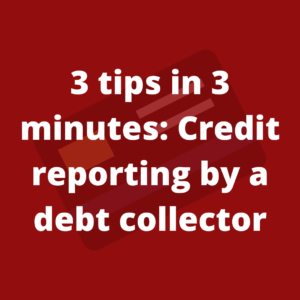3 tips in 3 minutes: Credit reporting by a debt collector
 Here are three simple tips that you can quickly learn and then take action on when dealing with credit reporting by a debt collector. (We have longer articles but this will be a good start).
Here are three simple tips that you can quickly learn and then take action on when dealing with credit reporting by a debt collector. (We have longer articles but this will be a good start).
Here are the three tips and then we’ll briefly discuss them:
- See if there is any obvious inaccuracy
- Dispute the debt directly with the debt collector if you need information
- Dispute the debt with the credit reporting agencies if you the first two options don’t apply
Tip One: Is there any obvious inaccuracy in the credit reporting?
Sometimes a debt collector is credit reporting and it is clearly wrong. So let’s first look for this and then we’ll talk about what you can do.
Here are some examples:
- You have paid off the debt but the collector still shows a balance owing
- You were sued and won but the collector is still credit reporting on you
- Multiple collectors are reporting the same debt
- The debt has been discharged in bankruptcy but it is showing a balance owed
- The amount is simply wrong
When you find these obvious errors, usually the choice of what to do comes down to this.
First, if you can show the collector knows (or should know) the information is wrong, consider suing immediately under the FDCPA. The FDCPA is the Fair Debt Collection Practices Act.
Second, if you feel the collector may not know about the error, you can either talk directly with the collector or do a dispute under the FCRA. The FCRA is the Fair Credit Reporting Act. This means you dispute through the credit reporting agencies (Equifax, Experian, and TransUnion) and most likely send a copy to the collector. If the false credit reporting is not fixed, you sue under the FCRA.
But what if there are no obvious errors?
Tip Two: If you need more information about the credit reporting, dispute directly with the debt collector.
When the errors might not be obvious, consider going directly to the collector asking for proof and answers to your questions.
You can call and ask the collector about this debt to figure out the details of it.
Or you can send a dispute letter. Here is a sample one and put in any specific questions you have.
For example:
- You are reporting a medical debt — which debt and where and when did I get this medical debt?
- You say I owe some type of cable bill — who and where and when?
- Which old credit card do you say I owe you for — give me the details
You get the point — it is wise to dispute in general (which our letter does) and then add any details you can.
Tip Three: Dispute with the credit reporting agencies if the first two tips don’t apply.
Sometimes the errors are not blatant so tip one does not apply.
And other times we don’t want to write directly to the collector.
So you can always do a dispute to the credit reporting agencies. Ask them to investigate the account. See if there are any factual inconsistencies in your reporting.
For example:
- Do you have two different dates of last payment?
- Two or three different balances?
- Different times the debt will come off of your reports?
- How about the type of debt — does one report say auto loan and the others say credit card?
The idea is to find any inconsistencies so that you can point these out.
In addition, if you don’t know much about the debt, ask for an investigation for all aspects of it as you don’t know what it is.
Bottom line: Take action now and then see if you need to follow up after you hear back from the collector or reporting agencies.
Now if you can sue right away, go ahead and do that.
But if you need more information, then see what you get and if it answers your questions. Often, however, the information provided will simply create new questions.
For example:
You dispute and ask what type of medical bill it is, and you are told it is for a hospital you have never attended.
What do you do now?
Maybe you sue as it is obviously an error (see Tip One).
Or maybe you now reach out directly to the collector to ask about what is the hospital bill when you never went there (see Tip Two).
Perhaps you now realize that doing a FCRA dispute would be good as if this false account is kept, your case is that much stronger. So you do your dispute to the credit reporting agencies and copy the collector with the dispute letter (see Tip Three).
If you have any questions we can answer, please reach out to us here or by calling us at 205-879-2447.
Have a great day!
John Watts
PS — If you like this, you should check out our YouTube channel where we share lots of useful content.